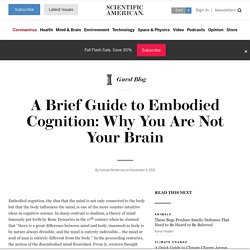

"Moving Through Time" and embodied cognition. In which I am a bit rude about a rubbish paper and worry about how to kill papers like it.

The term 'embodied cognition' has been checked out of the library by a lot of different people, all of whom use it to mean something different. My least favourite definition comes from the cognitive literature, which considers embodiment to be about how internal, abstract cognitive function can be 'revealed' motorically (the Barselou (2008) version of embodiment).
Embodied cognition is not what you think it is. The most exciting thing in cognitive science right now is the theory that cognition is embodied.

It is, in fact one of the things interested lay people know about cognitive science, thanks in part to a lot of high profile experiments that claim to show how cognition can be influenced and biased by states of the body, or that cognitive states can affect states of the body in ways that suggest abstract metaphors and concepts are grounded in the behaviour of the body. A recent blog post at Scientific American covers this ground quite nicely (although the large picture of Noam "not an embodied cognitive scientist" Chomsky hints that someone didn't actually read the piece). Embodied Cognition: What It Is & Why It's Important. I recently conducted the following interview with Dr. Andrew Wilson and Dr. Sabrina Golonka in regards to embodied cognition . Together, they write the popular blog PyschScienceNotes [ here ] as well as tweeting as @PsychScientist .
Given their willingness to often blog and tweet on this topic, I reached out to them to offer everyone some basics on what embodied cognition is, what it is not, and why it is important—to everyone. Enjoy! For Christians, Dawkins and the Qur'an leave a bad taste in the mouth, literally. Many studies have shown that moral disgust is "embodied".

Contemplation of taboo deeds really does leave people physically sickened. Now Ryan Ritter and Jesse Preston have extended this literature to show that religious beliefs that contradict one's own also leave a bad taste in the mouth, literally. The genius in this study is the cover story. Eighty-two Christian student participants were told they were taking part in two separate investigations: one a marketing survey requiring that they taste two different drinks; the other a study of handwriting and personality.
The participants first tasted a lemon-based drink and rated it. In reality the two drinks were identical and the key measure was how the participants responded to the drink after exposure to religious beliefs that contradicted their own. Other ratings of the drink, such as bitterness or sourness, were unaffected so this was a specific effect on disgust. RS Ritter and JL Preston (2011). A Brief Guide to Embodied Cognition: Why You Are Not Your Brain. Embodied cognition, the idea that the mind is not only connected to the body but that the body influences the mind, is one of the more counter-intuitive ideas in cognitive science.

In sharp contrast is dualism, a theory of mind famously put forth by Rene Descartes in the 17th century when he claimed that “there is a great difference between mind and body, inasmuch as body is by nature always divisible, and the mind is entirely indivisible... the mind or soul of man is entirely different from the body.” In the proceeding centuries, the notion of the disembodied mind flourished. From it, western thought developed two basic ideas: reason is disembodied because the mind is disembodied and reason is transcendent and universal.
However, as George Lakoff and Rafeal Núñez explain: Cognitive science calls this entire philosophical worldview into serious question on empirical grounds... What exactly does this mean? Embodied cognition has a relatively short history. Our perceptions of masculinity and femininity swayed by our sense of touch. Gender stereotypes suggest that men are usually tough and women are usually tender.

A new study published in Psychological Science, a journal of the Association for Psychological Science, finds these stereotypes have some real bodily truth for our brains; when people look at a gender-neutral face, they are more likely to judge it as male if they're touching something hard and as female if they're touching something soft. Several studies have found recently that we understand many concepts through our bodies. For example, weight conveys importance; just giving someone a heavy clipboard to hold will make them judge something as more important than someone who holds a light clipboard.
Michael Slepian, a graduate student at Tufts University, and his colleagues wanted to know if this was also true for how people think about gender. For one experiment, people were given either a hard or a soft ball to hold, then told to squeeze it continuously while looking at pictures of faces on a computer.